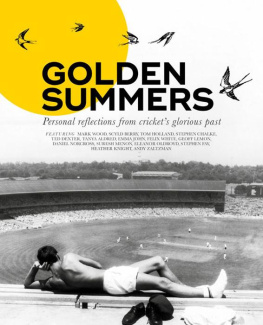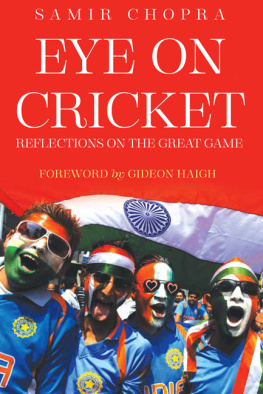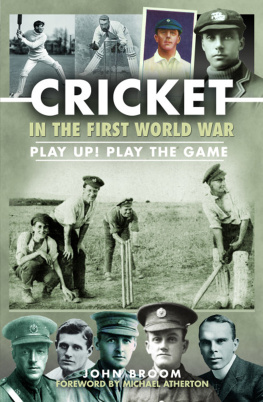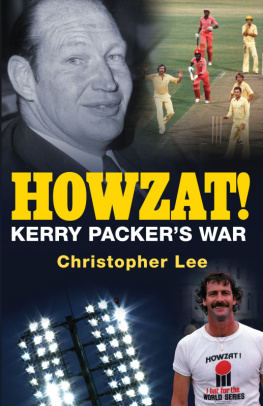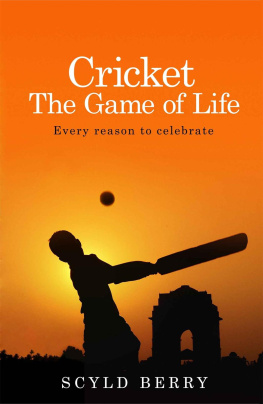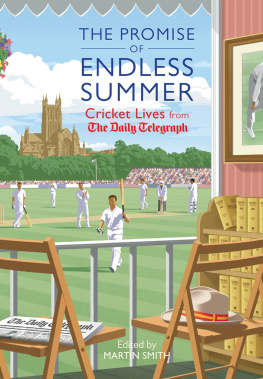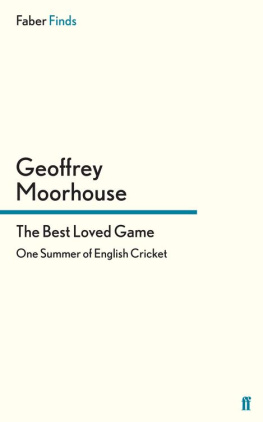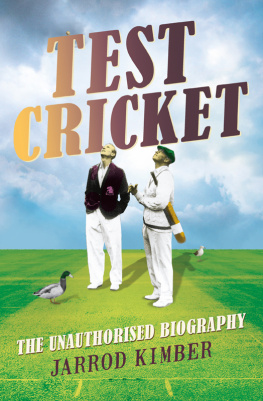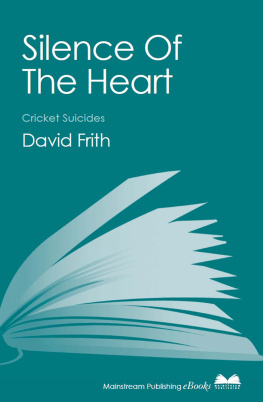
CONTENTS
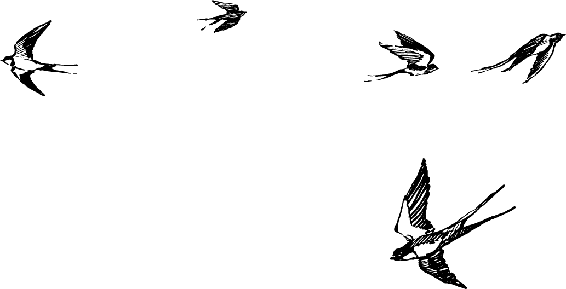

INTRODUCTION
I nside these pages are contained 50 essays from as many different writers, covering a half-century of distinct yet inseparable cricketing years.
Youll find here every conceivable style of cricket writing, a cornucopia of actors, musicians, comedians, historians and even a couple of World Cup winners muscling in alongside some of the finest cricket writers in the game. It makes on paper for a formidable cast list, and quite a show. A galaxy of stars, if you will, and usefully affordable ones at that.
Very few arms needed twisting. Almost everyone who was asked to contribute was up for it, and I guess it stands to reason: who wouldnt, given the luxuriant licence of the first-person, fancy having a run at articulating, at getting to the bottom of , this evidently irrational, defiantly persistent fixation with balls and bats and floppy hats. The chance for a cricket lover to delve into how they ended up where they are, arranging the moments that shaped that love around the big stuff of the day, is not easily resisted.
Cricket, they say, is just escapism. Its a day off, a departure, a sublime waste of time that matters only because it doesnt. And there is, and has to be, some truth in that it is just a game in the end, albeit the game. In these pages youll find a handful of writers wrestling with this point, but no more than a few. More likely youll be struck by the games gravitational force, the feeling of being pulled towards something, offering a way in , not a way out. Its the first match we saw. Its the catch we dropped in the rain. Its the moment we fell in love. It is history, family, identity, memory. It seems to me that this is crickets real genius: It can be as little or as much as we allow it to be.
So maybe its not so irrational after all. Whos to say that such devotion doesnt offer a pretty sensible response to the rootlessness of the real? That this way of life is any less plausible than another? After all, one doesnt merely like cricket. Its not really a game that can be taken or left. It remains either impenetrable or inescapable.
Each writer took the gig on their own terms. The brief was deliberately loose. Some kept their voice relatively muted and majored on the cricket taking place at the time. A few took themselves out of the story completely and let the game speak for itself. Others sidled along towards confessional memoir to see what that might throw up; most took bits from some or all of the above.
Memory keeps cropping up, in some cases as a kind of nagging concern that the recalled stories of our past are impressions of the real facts, and therefore flimsy. Its against this fuzziness where those irrefutable dots and digits come in. Cricket people, you will recognise, possess a strange capacity to measure their lives against the Test match duels and tournament failures of the day. When I came to revisit the moments of 1993 for my own entry Athertons run out, Warnes first ball, Suchys debut it felt like flicking through the pages of a dusty old diary, pulling those parched scorecards down off the shelf, for the stories to spill out from there.
This book is about famous moments from crickets greatest years. But its also about that other place, beyond the primly cut squares of ascertainable fact, among the rolling outfields of personal experience. Among the outer reaches, where cricket lives and breathes. Where the real stuff happens.
Phil Walker, November 2020
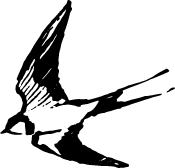
ROBERTWINDER
1934
PAGEANTRY BETWEEN THE WARS
An historic Hedley Verity-inspired victory at Lords was just the start of an amazing sporting spectacle that lit up the summer of 1934
W hen Graeme Swann sealed a rare Ashes win at Lords in 2009 (bowling Mitchell Johnson) the celebration was given extra warmth by the fact that this was the first English victory in this famous fixture for over 70 years. But flicking back to that grand day in 1934, when Australia were toppled by the left-arm spin of Yorkshires Hedley Verity, I was surprised to learn that this was not merely the last time England had beaten Australia at Lords: it was the only time they won there in the entire 20th century. And it was the high point of an unusually tense summer, since this was the rematch following the furious winter of 1932/33, when Douglas Jardines England had battered Bradman and company in Adelaide and Sydney, using Harold Larwoods electrifying bowling as the spearhead of a bad-tempered new gambit: Bodyline.
So the atmosphere at Lords that grey weekend was rapt with expectation.
England batted first and scored 440, and when Verity dismissed the Don in the first innings (caught and bowled, following a strangely hesitant swish) the billboards read simply: Hes out! Bradman was a nonpareil , so everyone knew what that meant.
Australia finished the second day on 192-2, leaving the game well-balanced. But overnight rain gave the next days pitch a dark green tinge, and when Verity looked out of his hotel window he could see gleams of water streaking silver on the road.
I shouldnt wonder if we dont have a bit of fun today, he murmured.
When he came on to bowl a few hours later, drifting to the wicket in that famously unhurried way of his lightly and decisively, as his captain put it the game at once took on a fresh complexion. As always, Verity found an impeccable length right away, but the ball was turning and lifting too. In the slips, Walter Hammond was smiling. We knew, he said later, that the Lord had delivered them into our hands.
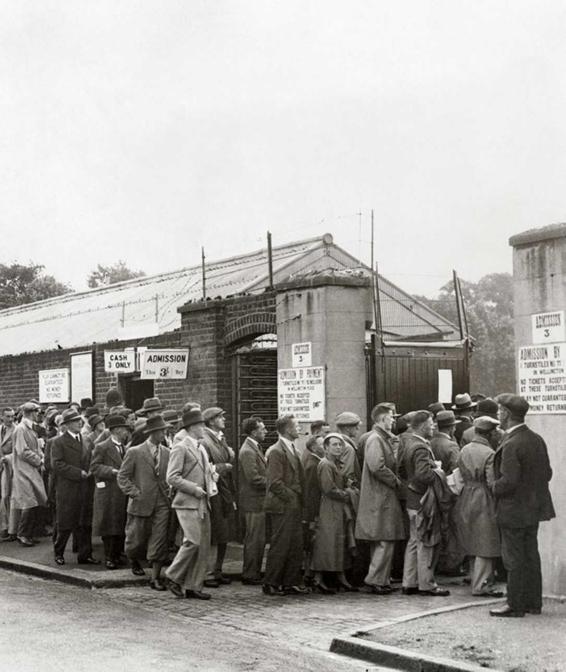
Crowds queue up for the second Ashes Test at Lords
It didnt take long. Out they marched, the baggy green caps, and back they traipsed. As Herbert Sutcliffe put it: When the rain had done his work, Verity was able to do his work, and that was the end of it. He took 6-37 in a flash, and when Australia followed on he was at it again, plucking their feathers like a fox in a chicken coop.
As always, the key wicket was Bradmans. From the word go he seemed fidgety, and when Verity floated one at his leg stump he leapt at it, dropped his shoulder like a novice and had a swing. The ball flashed high into the murky Lords air until Ames trotted forward and took the catch. Australias chief and legendary hope was gone.
In Bill Bowes view it was one of the worst shots he ever played; Bob Wyatt judged it born of desperation. Either way, the heart seemed to go out of Australia in a rush. They came, they took guard, and back they went. The last wicket fell at 10 to six, meaning that Verity had bowled virtually unchanged for over five hours, taking 14 wickets in a single day bettering his merely useful 7-61 in the first innings with a superlative 8-43 in the second. After tea he snagged six for just 15 runs.
Veritys stunning effort was only the start of the amazing sporting pageant that lit up the summer of 1934. On the same day he polished off the Australians, Henry Cotton was setting out on what would prove to be a record-breaking tilt for the Claret Jug at Royal St Georges in Kent (the historic 65 he shot in the first round actually inspired Dunlop to name a golf ball after it). And a week or so later, a coming thing named Frederick Perry was warming up for the first of his three Wimbledon victories.
Next page
